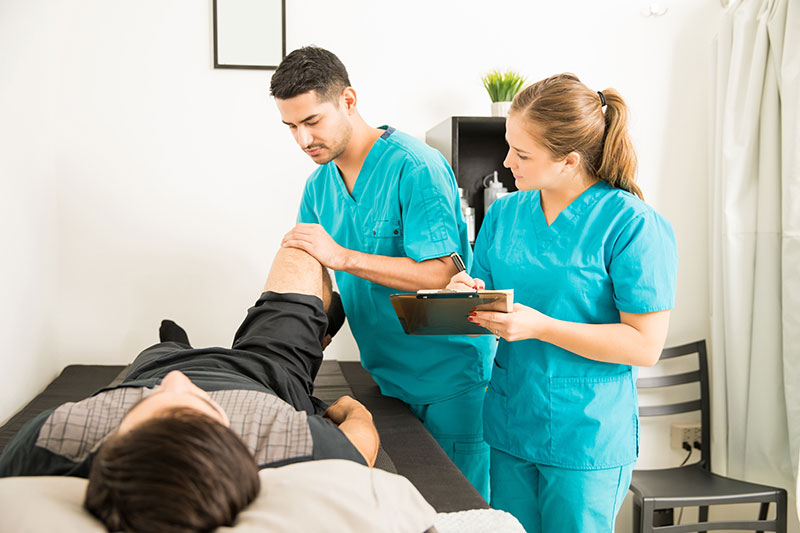Workers’ compensation covers most workplace injuries, including slip, trip and fall injuries. These accidents and consequent injuries can occur in all types of work environment, and the severity of injury may differ with each type of work and work environment. Injured workers can claim workers’ compensation coverage for a slip, trip or fall injury that may require medical record analysis to determine the legal validity of the claim. Workers’ compensation is a “no-fault” system and therefore even if the worker was at fault for causing his/her own injury, he/she could receive compensation provided the injury happened while working. This is where it differs from a personal injury claim where the victim has to prove that another person is at fault for causing the alleged injury.
How Do Slips, Trips and Falls Occur?
Slips, trips and falls at the workplace may be categorized into falls on the same level and falls from an elevated level. Same-level slip and falls are caused by slipping on slippery surfaces, and on snow and ice. Trips are caused by walking on uneven surfaces or into objects misplaced on the way. Falls from a higher level are common in the construction industry, agriculture, mining, forestry and similar fields. These injuries can be sometimes fatal. Therefore, employers are required to provide the appropriate training, strict supervision, and state-of-the-art safety protection for their employees to prevent falls and subsequent injuries.
Types of Injuries Caused by Slip and Fall Accidents
Following are some of the common injuries caused by slip, trip, and fall injuries and for which medical evidence is extracted via comprehensive medical chart review.
- Broken bones in various parts of the body such as the hips, legs, arms, shoulders, ribs, and collar bone
- Neck injuries caused by damage to the spinal cord, or the muscles, ligaments, or tendons in the neck
- Spinal cord injuries including fractured vertebrae, pinched nerves, and herniated/slipped discs among others.
- Concussions and other forms of traumatic brain injuries
- Knee and ankle injuries
- Shoulder, elbow, and wrist injuries
- Severe cuts/lacerations
- Injuries to the face
- Pain resulting from any serious injury
Steps to Follow to Recover Workers’ Compensation Benefits
- In nearly all U.S. states, the injured worker has to first report the injury to the employer. Typically, this report has to be made within 30 days to one year. In some states, this reporting period may be just three or four days. A worker who has experienced a slip and fall injury may not immediately notice the effect of the injury or symptoms. It is best therefore to report the fall even if there are no outward signs. Prompt reporting of any fall and injury can also contribute to convincing the workers’ compensation insurer that the accident occurred at the workplace. It is important to include all details regarding what caused the fall, which body part(s) were injured, any pain experienced and so on.
- Obtain medical treatment as soon as possible after sustaining the injury. If an injury is serious, it may take days or even weeks to begin causing pain and severe limitations. It is not a good idea to delay seeing a doctor because the employer may argue that the injury occurred outside of work. On the other hand, prompt diagnosis of injuries after a slip and fall will strengthen the claim that the injury is work related. It is important, though, to report to the doctor that the visit is following an accident and injury at work. Another key aspect to note is that in many U.S. states, the employer has the right to choose the doctor/healthcare provider who will treat the employee for the work-related injury, except in cases that need emergency care.
- Properly document the scene of accident: If possible, the employee can take photos or video of the object that caused the slip/trip, and other details such as lighting conditions or visual obstructions. If a co-worker has witnessed the accident, it would be ideal to get his/her statement also.
- Side-by-side with reporting the injury to the employer, the employee must also file a claim with their state’s workers’ compensation agency. Some states require the employer to file the claim and in some other states, the employee can get the form to file the claim from the employer and file it on their own.
A number of workers are not aware that slip and fall accidents may also receive workers’ compensation. As a medical record review company assisting workers’ compensation attorneys, we understand that just as other injuries at work, a slip, trip and fall injury at the workplace may also be covered by workers’ compensation. The benefits provided is meant to cover all reasonable and necessary medical treatment and rehabilitation as well as partially replace the worker’s wages or income if he/she misses work because of the injury. Obtaining workers’ compensation benefits could be challenging and time-consuming if the employee chooses to pursue this on his or her own. A good option is to consult a workers’ compensation attorney who can determine the legal validity of the claim and provide the needful advice and assistance with filing the claim.
Managed Outsource Solutions has almost 20 years’ experience in providing HIPAA-compliant, value-added medical record review services for the legal community, insurance companies, healthcare providers and private corporations.
For more details about our dedicated medical review solutions for workers’ compensation cases, call our toll-free number: 1-800-670-2809
Disclaimer: The content in this blog is sourced from various reliable internet resources and is meant only for informative purposes. It does not constitute the inference or opinion of Managed Outsource Solutions (MOS) or any of its stakeholders. For a professional opinion on this topic, contact an experienced workers’ compensation attorney.




